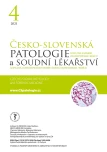-
Medical journals
- Career
Pathologia mutans
Authors: Petra Kašparová; Ivo Šteiner
Authors‘ workplace: Fingerlandův ústav patologie LFHK a FN, Hradec Králové
Published in: Čes.-slov. Patol., 57, 2021, No. 4, p. 226-231
Category: Original Articles
Overview
The authors present results of our center retrospective study comparing autopsy findings from years 1929 (n=275) and 1989 (n=974). The male to female ratio was very similar in both cohorts (1.3 : 1 in 1929 and 1.4 : 1 in 1989). The age range in 1929 was 0-88 years with median of 50 years, whereas in 1989, the age range was 0-98 year and median was 65 years. Among lethal diseases in 1929 were namely infections and infectious complications – 61 % of all patients (out of these, 18 % were tuberculosis cases), neoplasms (12 %) and cardiovascular disorders (6.5 %). In 1989, malignant neoplasms were most frequent (31 %), followed by cardiovascular disorders (21 %) and infections (4.6 % - out of these, tuberculosis represented only 0.6 %).
Our study is unique by comparing two well documented autopsy cohorts in a single center from two years being 60 years apart. The study clearly demonstrates dramatic changes in healthcare achieved during the 20th century.
Keywords:
pathology – healthcare – Autopsy – autopsy findings – lethal diseases
Sources
1. Burton J. A bite into the history of the autopsy (from ancient roots to modern decay). Forensic Science, Medicine, and Pathology 2005; 1(4): 277.
2. Lanjewar DN, Sheth NS, Lanjewar SD, Wagholikar UL. Analysis of causes of death as determined at autopsy in a single institute, the Grant Medical College and Sir J. J. Hospital, Mumbai, India, between 1884 and 1966. Arch Pathol Lab Med 2020; 144 : 644-649.
3. Friberg N, Ljungberg O, Berglund D, Ljunberg R, Alafuzoff I, Englund E. Cause of death and significant disease found at autopsy. Virchows Archiv 2019; 475 : 781-788.
4. Dehner LP. The medical autopsy: past, present and dubious future. Missouri Medicine 2010; 107(2): 94-100.
5. Panchabhai TS, Patil PD, Shah DR, Joshi AS. An autopsy study of maternal mortality: a tertiary healthcare perspective. J Postgrad Med 2009; 55(1): 8-11.
6. Cox JA, Lukande RL, Lucas S, Nelson AM, Marck E, Colebunders R. Autopsy causes of death in HIV-positive individuals in sub-Saharan Africa and correlation with clinical diagnoses. AIDS Rev 2010; 12(4): 183-194.
7. Juric G, Tentor D, Jakic Razumovic J. Autopsy findings and clinical diagnoses: retrospective study of 3,117 autopsies. Croat Med J 1999; 40(1): 71-76.
8. Wijhe M, McDonald S, Melker HE, Postma M, Wallinga J. Effect of vaccination programmes on mortality burden among children and young adults in the Netherlands during the 20th century: a historical analysis. The Lancet Infectious Diseases 2016; 16(5): 592-598.
9. Cunningham RM, Walton MA, Carter PM. The major causes of death in children and adolescent in the United States. N Engl J Med 2018; 379(25): 2468-2475.
10. Suarez AV, Tsutsui N. The value of museum collections for research and society. BioScience 2004; 54(1).
11. Ryška A, Betlach J. Možnosti využití imunohistochemie pro upřesnění diagnózy z historických parafinových bloků. Cesk Patol 2019; 55(2): 122-125.
Labels
Anatomical pathology Forensic medical examiner Toxicology
Article was published inCzecho-Slovak Pathology

2021 Issue 4-
All articles in this issue
- Patologie placenty – nové a méně známé jednotky
- Placenta je tichým svědkem gravidity, jen je potřeba ho donutit mluvit
- 'NEUROPATOLOGIE
- 'HEPATOPATOLOGIE
- 'PULMOPATOLOGIE
- 'ORTOPEDICKÁ PATOLOGIE
- 'PATOLOGIE GIT
- 'PATOLOGIE ORL OBLASTI
- 'GYNEKOPATOLOGIE
- 'UROPATOLOGIE
- 'KARDIOPATOLOGIE
- 'CYTODIAGNOSTIKA
- Morphologic findings in placenta associated with SARS-CoV-2 infection
- Placental mesenchymal dysplasia – morphology and differential diagnosis
- Chronic non-infectious inflammations of the placenta
- 'HEMATOPATOLOGIE
- Pathologia mutans
- Jaká je vaše diagnóza?
- Professor Jaroslav Hlava and his successors – a remembrance on the occasion of the 100th anniversary of the opening of the Hlava institute
- 100th anniversary of the opening of the Hlava institute
- Jaká je vaše diagnóza? Odpověď: Karcinom prsu metastazující do placenty
- Prof. MUDr. František Fakan, CSc. in memoriam
- Non-immune hydrops fetalis associated with two umbilical cord hemangiomas and vascular malformation of the transverse mesocolon. Case report
- Subcutaneous symplastic haemangioma after radiotherapy: A case report
- Czecho-Slovak Pathology
- Journal archive
- Current issue
- Online only
- About the journal
Most read in this issue- Chronic non-infectious inflammations of the placenta
- Morphologic findings in placenta associated with SARS-CoV-2 infection
- Patologie placenty – nové a méně známé jednotky
- Placental mesenchymal dysplasia – morphology and differential diagnosis
Login#ADS_BOTTOM_SCRIPTS#Forgotten passwordEnter the email address that you registered with. We will send you instructions on how to set a new password.
- Career

